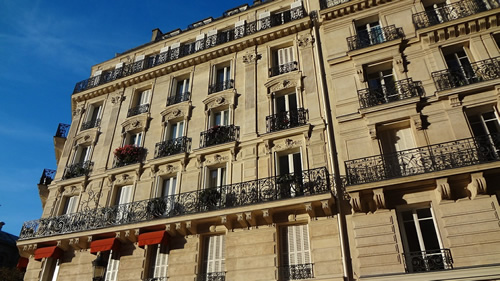A Guide to Parisian Apartment
Hunting
by Amber Foster

|
|
Many buildings are divided into apartments in Paris.
|
Whether you plan to work or study in
Paris, your apartment is central to your new French lifestyle.
You may imagine yourselves sipping cafe au lait on a balcony
overlooking the Seine, admiring the view of the Eiffel Tower
above the rooftops. This is a nice dream, but unless you
are very rich, it is not likely to become a reality. Finding
a long-term apartment in Paris can be difficult and frustrating,
especially if you are on a limited budget, and many renters
end up in apartments that are far from their ideal.
Knowing what to expect and what potential
obstacles you might face can greatly improve your chances
of not only finding that dream apartment, but also making
sure the experience of living there is a pleasant one.
Getting Started
The first thing you need to do is find
a temporary place to stay during your apartment hunt. It
usually doesn’t take more than two weeks to find a
place, although you should make sure to reserve two full
weekends for your search — the time when most owners
prefer to show their apartments. In the meantime the easiest
thing to do is stay at a budget hotel or rent a tourist
apartment. Check out Hostelworld for
inexpensive hotels and hostels.
If you want kitchen or washing facilities,
renting a vacation rental apartment from an organization
such as AirBnB may
be more practical; frequently the price is the same as staying
in a hotel. Call the local tourist board or surf the web
for apartment
rentals in Paris to find something that works for you.
Where to Look
At any local news kiosk you will
find a variety of papers with real estate classifieds.
The best one is De
Particulier a Particulier, issued every Thursday
morning. Some of its ads are viewable on its website
for free. Its lists include apartments as well as ads
for "apartment sharing," called "collocation."
Classified websites charge a small
fee to view owners’ contact information (most notable
is Seloger, or
for the more daring, CraigsList
Paris).
If your French isn’t quite up
to speed, you have several options. First, go onlineor pick
up a copy of the FUSAC,
a free bilingual magazine issued every other Wednesday,
with distribution points all over the city. Another good
place to look is at the American
Church in Paris, located at 65 Quai d’Orsay. Drop
by during their operating hours to check out their nifty
bilingual bulletin board, which is updated daily.
Remember, good apartments rent quickly,
so start calling owners the morning the classifieds come
out and make appointments to see the apartments as soon
as convenient for them.
What to Look For
I cannot emphasize enough the importance
of a close examination of any apartment you want to rent.
Here are some questions to keep in mind:
-
Is it furnished? (Putting
in furniture can be expensive and difficult.)
-
Does it have direct sunlight
through the windows, or is the view obstructed?
-
Does it have a washing
machine, microwave, or any other appliance you cannot
live without?
-
Is the heating with gas
or electric? (Electricity is more expensive
than gas; sometimes gas heating is included in the
rent.)
-
Does it appear clean and
well maintained?
-
Does the landlord have
any rules or restrictions that will negatively impact
your lifestyle?
-
Does the landlord seem
professional, experienced, friendly?
-
Is it big enough for your
needs?
-
Is it centrally located? (The
general rule for Paris is that the closer to the center
you go, the more expensive it will be. Apartments in
the suburbs may be more reasonably priced and larger,
but the neighborhood may leave much to be desired.)
-
Is it near local transport? If
you plan to work in Paris, will living there require
a long commute or more than two transfers on the metro?
Be prepared to compromise if
necessary. Also, if you plan to bring your significant
other with you, remember that it is often much harder
to find 2-bedroom apartments, and you may need more time
to locate a suitable place.
Be wary of renting chambres de bonne
(former maid’s quarters). These are inexpensive rooms
typically located on the top floor of apartment buildings
without elevators. They’re cheap for a reason.

|
|
Apartment building in Paris.
|
The Contract
Once you have found a place,
you will need to sit down with the owner and carefully
go over the contract. If you can’t read French,
find someone to help you translate. Make sure you understand
what you are agreeing to, and discuss any questions you
might have with the owner before signing. Questions to
keep in mind are:
-
How much is the deposit? (One
month, or two months for a furnished rental.)
-
Are there any additional
monthly fees or taxes? Does your rent include
water, gas, electricity?
-
Does the landlord agree
to fix broken appliances and repair plumbing, or is
it the renter’s responsibility?
-
Will the owner deduct for
painting or re-carpeting after you move out?
Most importantly, make sure to complete
an état des lieux, a document which lists
in minute detail the condition of the apartment before you
move in. A bad landlord might find any excuse to deduct
from your deposit, ranging from handprints on the wall to
a missing frying pan. Stains on the carpet or furniture,
broken appliances, and holes in the walls (even pinholes!)
should all be listed. An hour or two spent itemizing can
save you weeks of frustration after you move out. It is
all too easy for landlords to take advantage of foreigners
who are not familiar with the system and who would have
little legal recourse in a dispute.
Housing Taxes
If you are living in an apartment
on January 1, you have to pay a housing tax, called the tax
d’habitation. Even if you moved in on December
31, the current resident on the first of the year is
responsible for the entire year’s tax. This amount
varies depending upon how much rent you pay, but it can
add up to several hundred nonrefundable euros going to
the government each year.
Again,
the laws change quite often, so do
research your rights on the web and ask any Parisians
you know to minimize the hassle.
But ultimately, my own advice is simple:
pay the tax. The tax bureau will have your permanent address
in their records and will send you invoices for the tax
no matter where you are. The longer you delay, the more
interest you’ll pay, and they can go so far as to
make you "interdit de territoire," or
prohibited from ever living in France again.
Getting Back Your Deposit
Your landlord should make an
appointment with you to go over the état des
lieux and inspect the apartment and should make
deductions based on any damage you have done during your
stay. There may also be deductions for cleaning, painting,
and re-carpeting. Go over the list item by item, making
sure you agree to all the deductions. French people expect
you to negotiate, and the key is to be firm while also
remaining polite and respectful.
Even for native Parisians, finding
a great apartment is a challenge. In the end you may not
find an apartment bordering the Seine, but you will find
a place where you can be comfortable and secure while you
live out your own Parisian dream. Feel free to tell your
Parisian friends about your struggles with landlords, contracts,
and apartment hunting. “C’est la vie,” they’ll
tell you. “Bienvenu en France.”
Amber Foster currently
resides in California.
|
